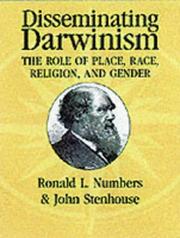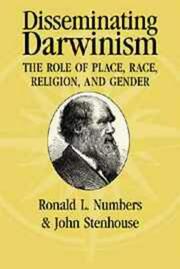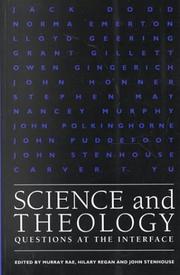| Listing 1 - 9 of 9 |
Sort by
|

ISBN: 0521011051 0521620716 0511572964 Year: 1999 Publisher: Cambridge : Cambridge University Press,
Abstract | Keywords | Export | Availability | Bookmark
 Loading...
Loading...Choose an application
- Reference Manager
- EndNote
- RefWorks (Direct export to RefWorks)
This innovative collection of original essays focuses on the ways in which geography, gender, race, and religion influenced the reception of Darwinism in the English-speaking world of the late nineteenth and early twentieth centuries. Although studies of Darwin and Darwinism have increased dramatically in the past few decades, knowledge of how various groups and regions responded to Darwinism remains unknown. The contributions to this volume collectively illustrate the importance of local social, physical, and religious arrangements, while showing that neither distance from Darwin's home at Down nor size of community greatly influenced how various regions responded to Darwinism. Essays spanning the world from Great Britain and North America to Australia and New Zealand explore the various meanings for Darwinism in these widely separated locales, while other chapters focus on the difference it made in the debates over evolution.
Human evolution --- Human geography --- Race relations --- Sex role --- Social Darwinism --- -Social Darwinism --- -Darwinism, Social --- Competition --- Social change --- Social conflict --- Social evolution --- Gender role --- Sex (Psychology) --- Sex differences (Psychology) --- Social role --- Gender expression --- Sexism --- Integration, Racial --- Race problems --- Race question --- Relations, Race --- Ethnology --- Social problems --- Sociology --- Ethnic relations --- Minorities --- Racism --- Anthropo-geography --- Anthropogeography --- Geographical distribution of humans --- Social geography --- Anthropology --- Geography --- Human ecology --- Evolution (Biology) --- Physical anthropology --- Evolutionary psychology --- Human beings --- History --- Religious aspects --- Origin --- -Gender role --- Darwinism, Social --- Anthropogéographie --- Biogéographie humaine --- Cultural geography --- Distribution géographique de l'homme --- Espace géographique --- Geografie [Menselijke ] --- Geographical distribution of man --- Geography [Cultural ] --- Geography [Human ] --- Geography [Social ] --- Homme -- Distribution géographique --- Integration [Racial ] --- Menselijke geografie --- Oecoumène --- Oekoumène --- Rassenverhoudingen --- Relations [Race ] --- Écoumène --- Ékoumène --- Darwin, Charles, --- Darwin, Charles, Robert --- Influence. --- Darwin, Charles --- Human evolution. --- Human geography. --- Race relations. --- Sex role. --- History. --- Religious aspects. --- -Integration, Racial --- Arts and Humanities --- Gender roles --- Gendered role --- Gendered roles --- Role, Gender --- Role, Gendered --- Role, Sex --- Roles, Gender --- Roles, Gendered --- Roles, Sex --- Sex roles --- -History

ISBN: 9780511572968 9780521620710 9780521011051 Year: 1999 Publisher: Cambridge Cambridge University Press
Abstract | Keywords | Export | Availability | Bookmark
 Loading...
Loading...Choose an application
- Reference Manager
- EndNote
- RefWorks (Direct export to RefWorks)

ISBN: 9781474281522 1474281524 9781474281539 9781474292986 0567292657 1474293476 1474281532 9780567292650 9781474281553 9781474281546 9781474281386 Year: 2018 Publisher: London : Bloomsbury Publishing,
Abstract | Keywords | Export | Availability | Bookmark
 Loading...
Loading...Choose an application
- Reference Manager
- EndNote
- RefWorks (Direct export to RefWorks)
"In popular culture, science and theology have often been portrayed as antagonistic. Some writers have described the history of the debate in terms of a surrender by theology, a retreat from the field of engagement: theology has abandoned the public arena, leaving all creation to science, and has opted instead for the safer ground of ethics, morality and personal or private belief. Science and Theology advocates a constructive dialogue between the two subjects and suggests the topics where they might meet. The essays in this volume were commissioned from leading figures around the world - experts in their own disciplines, but enthusiasts for debate at the science and theology interface. They include Norma Emerton, Owen Gingerich, Nancey Murphy, John Polkinghorne, John Puddefoot and Carver T. Yu. They discuss natural theology, the methodologies of science and theology, and theology in the light of scientific discovery. Their themes cover scientism, divine action in the world, the problem of evil, freedom and determinism, reductionism and humanity, the limits of knowledge, and chaos theory. Together, these essays offer a significant and positive contribution to one of the most exciting areas of modern thought."--Bloomsbury Publishing.
Natural theology. --- 215 --- Natural religion --- Theology, Natural --- Apologetics --- God --- Religion --- Religion and science --- Theology --- Philosophy of nature --- 215 Godsdienst en wetenschap --- 215 Religion et science --- Godsdienst en wetenschap --- Religion et science --- Natural theology --- Secularization (Theology) --- 261.6 --- 211.55 --- 211.55 Secularisatie. Entmythologisierung --- Secularisatie. Entmythologisierung --- 261.6 De Kerk en de cultuur: christelijke beschaving; Kerk en vooruitgang; Kerk en wereld --- De Kerk en de cultuur: christelijke beschaving; Kerk en vooruitgang; Kerk en wereld --- Secular theology --- Death of God theology --- Secularism --- Theology, Doctrinal --- Africa, Central --- Religion. --- Afrique centrale
Book
Year: 1875 Publisher: Bruxelles : Lacroix,
Abstract | Keywords | Export | Availability | Bookmark
 Loading...
Loading...Choose an application
- Reference Manager
- EndNote
- RefWorks (Direct export to RefWorks)
Digital
Year: 1770 Publisher: [n.p. [s.n.]
Abstract | Keywords | Export | Availability | Bookmark
 Loading...
Loading...Choose an application
- Reference Manager
- EndNote
- RefWorks (Direct export to RefWorks)
Inheritance and succession -- Scotland --- Estate settlement costs --- Gordon
Book
ISBN: 3319646869 3319646850 Year: 2018 Publisher: Cham : Springer International Publishing : Imprint: Palgrave Macmillan,
Abstract | Keywords | Export | Availability | Bookmark
 Loading...
Loading...Choose an application
- Reference Manager
- EndNote
- RefWorks (Direct export to RefWorks)
This volume explores the history of eugenics in four Dominions of the British Empire: New Zealand, Australia, Canada, and South Africa. These self-governing colonies reshaped ideas absorbed from the metropole in accord with local conditions and ideals. Compared to Britain (and the US, Germany, and Scandinavia), their orientation was generally less hereditarian and more populist and agrarian. It also reflected the view that these young and enterprising societies could potentially show Britain the way — if they were protected from internal and external threat. This volume contributes to the increasingly comparative and international literature on the history of eugenics and to several ongoing historiographic debates, especially around issues of race. As white-settler societies, questions related to racial mixing and purity were inescapable, and a notable contribution of this volume is its attention to Indigenous populations, both as targets and on occasion agents of eugenic ideology.
Eugenics --- History. --- Great Britain --- Colonies --- Social conditions. --- Imperialism. --- Social history. --- Imperialism and Colonialism. --- Social History. --- History of Science. --- Annals --- Auxiliary sciences of history --- Descriptive sociology --- Social conditions --- Social history --- History --- Sociology --- Colonialism --- Empires --- Expansion (United States politics) --- Neocolonialism --- Political science --- Anti-imperialist movements --- Caesarism --- Chauvinism and jingoism --- Militarism
Book
Year: 1876 Publisher: Manchester : Palmer & Howe,
Abstract | Keywords | Export | Availability | Bookmark
 Loading...
Loading...Choose an application
- Reference Manager
- EndNote
- RefWorks (Direct export to RefWorks)
Digital
ISBN: 9783319646862 Year: 2018 Publisher: Cham Springer International Publishing :Imprint: Palgrave Macmillan
Abstract | Keywords | Export | Availability | Bookmark
 Loading...
Loading...Choose an application
- Reference Manager
- EndNote
- RefWorks (Direct export to RefWorks)
This volume explores the history of eugenics in four Dominions of the British Empire: New Zealand, Australia, Canada, and South Africa. These self-governing colonies reshaped ideas absorbed from the metropole in accord with local conditions and ideals. Compared to Britain (and the US, Germany, and Scandinavia), their orientation was generally less hereditarian and more populist and agrarian. It also reflected the view that these young and enterprising societies could potentially show Britain the way — if they were protected from internal and external threat. This volume contributes to the increasingly comparative and international literature on the history of eugenics and to several ongoing historiographic debates, especially around issues of race. As white-settler societies, questions related to racial mixing and purity were inescapable, and a notable contribution of this volume is its attention to Indigenous populations, both as targets and on occasion agents of eugenic ideology.
International relations. Foreign policy --- Pure sciences. Natural sciences (general) --- World history --- History --- imperialisme --- wetenschapsgeschiedenis --- geschiedenis --- sociale geschiedenis --- kolonialisme --- South Africa --- Canada --- New Zealand --- Australia
Book

ISBN: 9780824840754 Year: 2022 Publisher: Honolulu
Abstract | Keywords | Export | Availability | Bookmark
 Loading...
Loading...Choose an application
- Reference Manager
- EndNote
- RefWorks (Direct export to RefWorks)
| Listing 1 - 9 of 9 |
Sort by
|

 Search
Search Feedback
Feedback About UniCat
About UniCat  Help
Help News
News